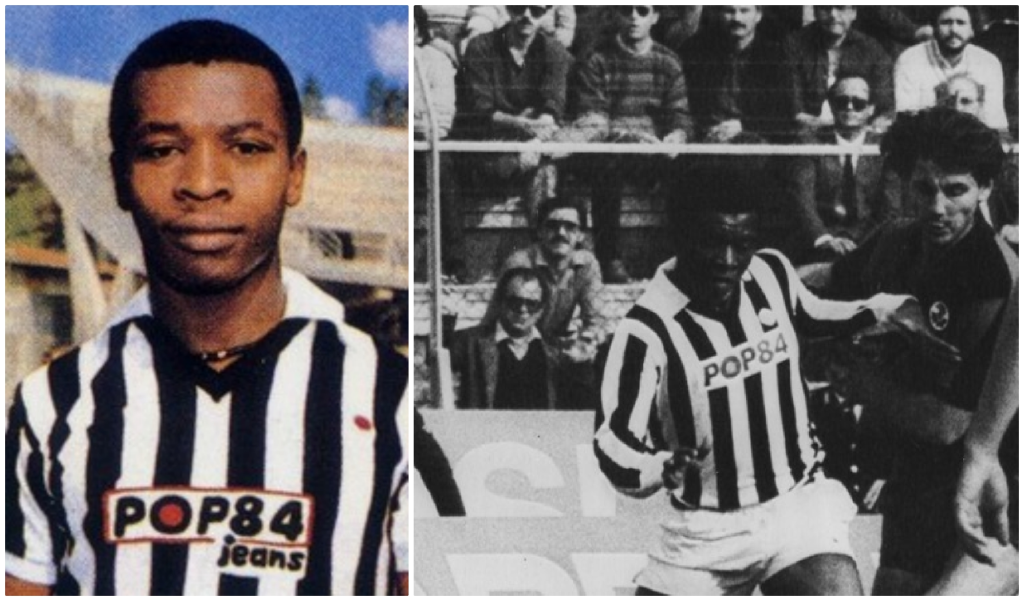On 27 September 1981, at the Stadio Artemio Franchi in Florence, Ascoli’s Francois Zahoui came on as a second-half substitute for Carlo Trevisanello as the visitors drew 0-0 with hosts Fiorentina. While the result may have been unremarkable, Zahoui’s appearance made history, as he became the first African to play in Serie A.
In the summer of 1981, the 18-year-old Ivorian left his home country and signed for Ascoli after impressing for Abidjan-based Stella Club d’Adjame at a youth tournament held in Marseille. The Italian club reportedly paid ten million Italian Lire for Zahoui’s services (just over 5,000 Euros in today’s money) and paid him the minimum-allowed wage of one million and two hundred thousand lire per month. He also received a gift of four million Lire from the President, which he sent back to his home in Africa.
Ascoli had come off a season in which they narrowly avoided relegation from the Italian top flight. They finished 10th out of 16 clubs, level on points with the four teams below them but with a superior head-to-head points count.
At the time, Serie A clubs did not look overseas for talent. Italy’s poor performance at the 1966 World Cup – where they were beaten by North Korea and the Soviet Union – was attributed to the number of foreign players in Serie A stifling homegrown talent. As a result, no new foreigners were admitted to the Italian league between 1966 and 1980. And the country itself was one of high emigration and little immigration.
At the start of the 1981-82 season, Zahoui was one of only 18 non-Italians playing in the league and although the numbers trended upwards the next season, with 32 foreigners, he was still the only African. Claudio Gentile had been born and brought up in Libya to Italian parents and even acquired the nickname “Gaddafi” yet he was not considered an African player. Black players were rare and those that came arrived from Brazil, not Africa.
Stereotypically, Zahoui was nicknamed “Negretto” and later “Zigulì” after the Italian fruit sweet but he was warmly welcomed by the people of Ascoli. He introduced himself in an interview with La Stampa by declaring: “I’m not a goal scorer. I play with the number 10 and I know how to pass the ball well to my teammates. I score some goals too, but not many!” He added, “I am already in love with this land of yours and with the affection of the Italians – I like Ascoli very much.” Unfortunately, his arrival was overshadowed by the arrest of Ascoli defender Angiolino Gasparini who was caught buying 50 grams of cocaine the same week.
There were rumours that Ascoli coach Carlo Mazzone had no input in the Zahoui transfer nor any need for the player. However, after a few weeks of working together, he was full of praise for the youngster: “I have changed my mind. Zahoui has proved to be an educated, reserved and very attentive person. He must have had a good childhood – they taught him how to behave in the world. I think he studied well: in addition to his mother tongue, he also speaks English correctly.”

From left, back: Mazzone (coach), Torrisi, Pircher, Boldini, Scorsa, De Vecchi, Anzivino, Mandorlini, Micucci, Capelli; center: Ilari, Perico, Trevisanello, Pulici, Muraro, Brini, Anastasi, De Ponti, Greco; bottom: Baldassarri, Gasparini, Zahoui, Nicolini, Carotti, Regoli, Scarafoni.
Whatever the circumstances, the talented youngster found it hard to establish himself in the Ascoli squad. He sometimes felt ostracized by the coach who often handed him the thankless task of wasting time in the final minutes of away games, yet he always did as asked. The Italian league was also more tactically complex and physical than he was used to and he struggled to adapt, making just eight appearances in his first season. However, he played his part in a campaign which saw the Picchios finish in an impressive sixth place, losing just once at home. The following year, the Ivorian made just three appearances as the club once again fought off relegation.
In search of a better fit, Zahoui moved to French side AS Nancy in the summer of 1983. There, he found his feet and became a mainstay in the Nancy team, making 112 appearances over four seasons. He also scored eight goals and earned his first call up to the Ivory Coast national team. When Nancy suffered relegation in 1987, Zahoui moved to Toulon and made a further 109 top-flight appearances over five seasons, scoring five goals. In 1992, he moved to amateur French side Nevers before retiring to pursue a coaching career.
Zahoui’s coaching career began in 1999 in the third tier of French football with former club Toulon. He progressed through the ranks and took the reins of the Ivory Coast in 2010, guiding his home country to a runner-up finish at the 2012 Africa Cup of Nations before managing the nation’s U-23 team from 2012 to 2015. A brief stint with Guinean side AS Kaloum in 2015 was followed by a four-year stint as manager of Niger’s national team. After leaving in 2019, he was appointed manager of the Central African Republic national team, where he is currently coaching.
Francois Zahoui may not have been the most accomplished African to play in Serie A but he did forge a respectable career as a player in France and as a manager at international level across Africa. More importantly, he broke a crucial barrier in Italian football and opened the door for the many African players who later enjoyed success in Serie A.

François Zahoui with Ascoli Coach Carlo Mazzone
Despite his lack of opportunities at Ascoli, Zahoui never complained and maintained a good relationship with the coach. Many years later, when Mazzone’s Bologna side played in their 1999 UEFA Cup quarter-final in Lyon, the two men met up to talk tactics and share some fond memories.
In collaboration with:


